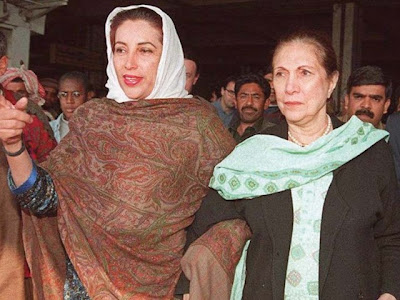When he became youngest member of Ayub Khan’s cabinet—a position that he held—handling successfully different important portfolios—until he resigned as Foreign Minister, his capable wife Begum Bhutto acquitted admirably well the responsibilities of bringing up their four children—Benazir, Murtaza, Sanam and Shahnawaz and also the role of playing a perfect hostess. She also lent support to her husband socially, looking after his swelling number of admirers and followers. Since good bearing was in their blood and top priority fixed for them by their father was acquisition of high quality education, it fell on the shoulders of Begum Bhutto to bring the children in such a manner that it should do Bhutto heritage a proud.
Despite the fact that as the wife of Pakistan’s most ever dynamic foreign minister she had to travel with him far and wide and play hostess at various functions by him, she did not allow any strain on her responsibilities as a perfect mother. Her total devotion in bringing up their children is perhaps the reason that all of their off-springs were highly educated.

The true strength and greatness of character—that she had in her blood by virtue of her ancestral lineage with the great Kurd—Salahuddin Ayubi—manifested itself when her husband broke away with President Ayub Khan for his surrendering to India at Tashkent followed by his resignation as foreign minister and formation of Pakistan’s People’s Party as harbinger of change and empowerment of the people. Once he was opposed to Ayub Khan, the military dictator unleashed the state hounds on him, incarcerated him and persecuted him to no ends. Begum Bhutto kept alighted the flame of her husband’s struggle for democracy and unshackling of the masses, braced to face the dictatorial batons, worst harassment and intimidations keeping the masses march onward until their victory.
Begum Bhutto, however, gave her best when Bhutto Sahib’s elected government was removed on July 5, 1977 by General Ziaul Haq’s coup in the dark of the night in the bleakest hour in the nation’s life. She not only lead the people and kept ignited their democratic aspirations when her husband was incarcerated facing a concocted murder charge. Though she was not alone this time as her equally talented and gifted daughter Benazir Bhutto was with her, she nominated by Bhutto Sahib as the party chairperson in his absence, kept the party flag high in defiance of a ruthless martial law and state oppression to the extent that she received a head injury in the baton charge by Zia’s thugs. And this head wound—having not allowed its proper and timely treatment-- had an ever lasting injurious effect on her to the extent that it has gradually disabled her. Despite that she has shown tremendous forbearance and tenacity. Assassination of her youngest son by Zia’s hired killers—Shahnawz Bhutto—did have a devastating effect on her followed by Murtaza Bhutto’s in the prime of his life. The head wound that did not overwhelm her not-withstanding constant persecution, character-assassination and life in exile, did finally lead to incurable consequences.
The revenge of the Pakistani people as manifested in the electoral victory of Pakistan People’s Party under her daughter Benazir Bhutto’s leadership in late 1988 and in 1993 despite the worst possible manipulations and rigging by the successive unrepresentative rulers and the highest number of votes PPP received in the overly flawed 2002 polls—are the fruits of the selfless devotion of Bhuttos to the people and the overwhelming confidence they enjoy among the masses.

Twice Begum Bhutto was elected member of the National Assembly, remained a senior minister and also a constant source of inspiration for her daughter former Prime Minister Benazir Bhutto, masses and PPP workers especially. She has done proud to the country by representing Pakistan at various international forums and her contribution as the Chairperson of the Red Crescent had gone a long way in improving the country’s image. She has also received various international awards for her immense contribution to the greatest good of the largest number especially workers, women and children.
Begum Nusrat Bhutto had always been a fighter. She fought the battle for the empowerment of the people in the streets against dictatorship. She fought for their rights in the apex courts. And even today she is fighting a battle with life under the constant care of her loving daughter Benazir Bhutto and her grand children so that she could see the fulfilment of the democratic dream of the Quaid and her martyred husband who walked to the gallows head high so that his people do not have to bow to oppression and dictatorship. May Allah, the Most Compassionate, give her strength and long life to see the end of the journey with the early return of democracy and blossoming of a civil society that ensures equality to all—irrespective of caste, creed or colour.



















